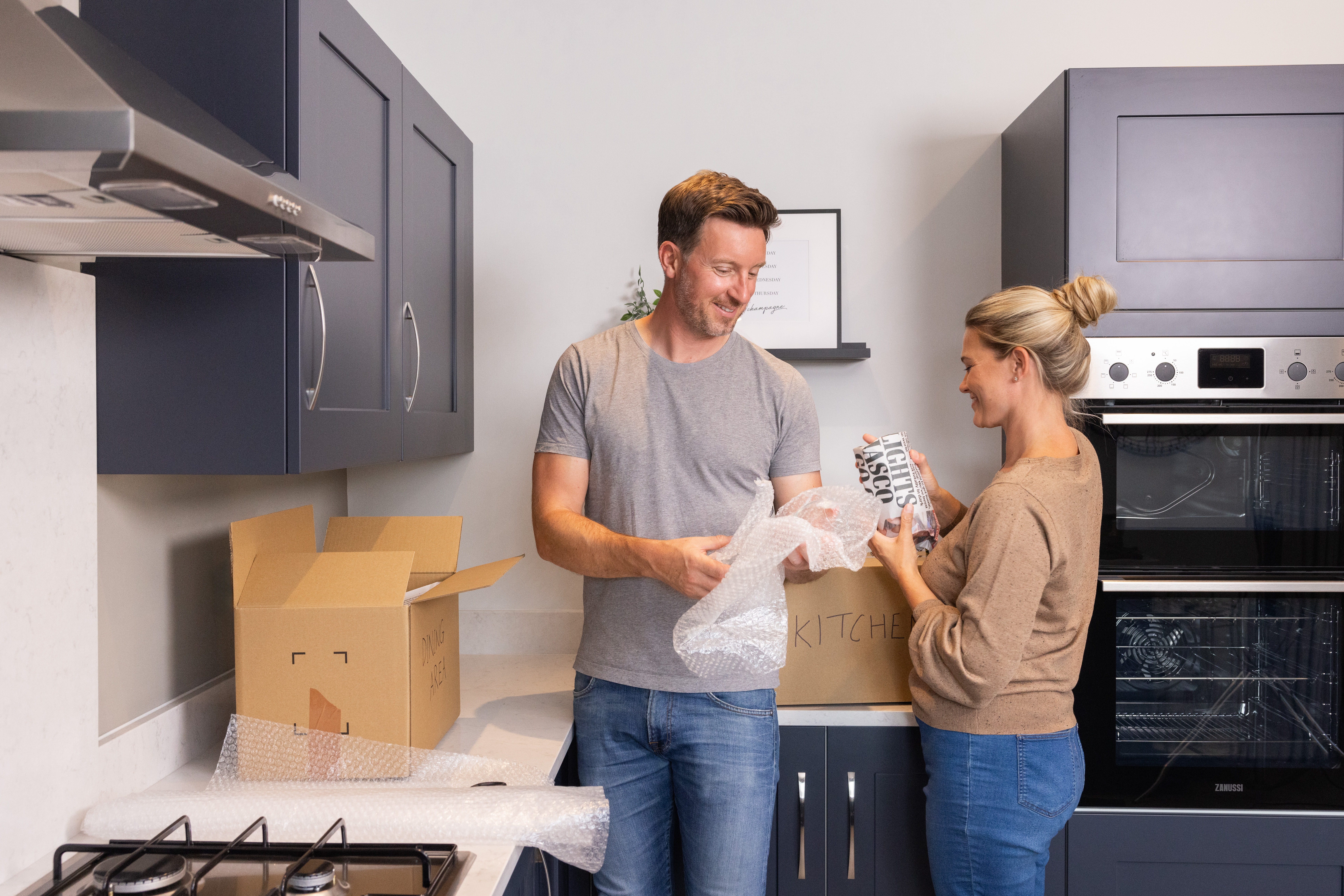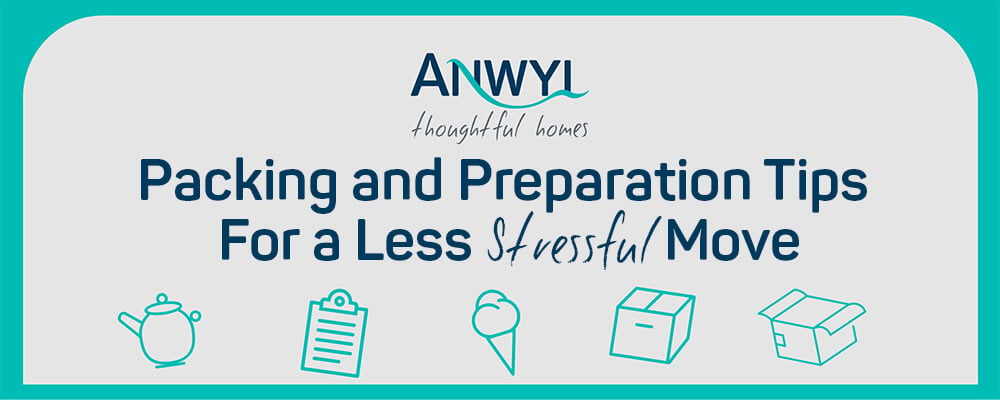
The Ultimate Moving House Guide: Tips & Stress-Free Strategies

Moving house is one of the most stressful and chaotic experiences of adult life, and while the chaos can’t be erased entirely, it can certainly be managed. With the right approach, from asking for help to packing in a strategic and step-by-step way, you can make your move run a whole lot smoother with our comprehensive checklist for moving house. Here are a few top tips to make your move go down like a fine wine.
What to Do When Moving House: Getting Help to Move
Hire a Moving Van
One of the largest moving house costs is the help you’ll need in order to get from Point A to Point B. Hiring a moving van helps to avoid several days’ worth of back-and-forth trips in a hired vehicle, and it’s well worth the price! Movers can help to carry heavy boxes, will pack the vans themselves, and they may even provide their own boxes for you to use. Check the ratings before you hire a company, and make sure you understand what they do (and don’t) offer.
Book a Storage Unit
If you’re downsizing or you simply can’t move all of your belongings in one day, a storage unit can help to set aside the clunkier objects before you have to move them. It can also ease the stress of packing, especially if you’re trying to manoeuvre around boxes while you work! Get a few items out of the way with a locker, and return to them once you’ve moved to the new place and have already started unpacking the boxes.
Order a Skip
If you’re clearing out a lot before the move, hiring a skip can make the whole process far more manageable. Handing over your unwanted stuff to a waste disposal company saves you the hassle of multiple trips to the tip and frees up more of your precious prep time. Just make sure they’re aware of your moving date and scheduled to collect the skip in advance.
Use a Scheme
If you’re moving into a new build, you may have access to a program like Move Simple. This can help to take the ‘buying a home’ process off your shoulders so that you can focus on packing and moving rather than solicitor’s meetings, letters and survey checks. Schemes are some of the best ways to move into your new home with as little stress as possible, and they may help you to feel more supported during your move.
Ask Friends and Family
There’s no shame in asking for help with a move. Friends and family will probably be happy to help, and they can take some of the strain off by watching the kids and pets while you pack. Put out some feelers when you’ve solidified your moving date, and see if anyone is able to help you and your family out.
How to Pack when Moving Houses
Step 1: Pack a Suitcase
You’re unlikely to have access to necessities during the first week in your new home. Clothes, shower gel, washing-up brushes, dishes and toilet paper won’t be waiting for you when you move in, which is why it’s important to pack those separately. It’s good practice to pull out one suitcase per person and fill it with everything you’ll need to last the week. That bit of foresight can also be a lifesaver if the moving vans don’t reach your new home right away!
Step 2: Donate & Bin
Separate your things into three piles: keep, donate and bin. You don’t want to be carting any unnecessary clutter to your new home — especially when you’ll only have to unpack it all on the other side! Clear out all the accumulated bits and pieces you no longer need or use, and your move will go far more smoothly. You might even save money on the moving vans if you cut down enough to lighten the load.
Step 3: Pack Per Room
Never fall into the trap of mixing up rooms. In your new home, you’ll want to be able to stack boxes in the room they belong in — if you’ve packed both living room and bedroom items together, you’ll be criss-crossing the house every time you unpack something. It’s important to pack each room separately, rather than taking a grab-it-all approach from the shelves. Keep a stack of boxes in each space, and avoid shifting them around as you go - especially if multiple people are helping out!
Step 4: Label Everything
All boxes need an informative label — anything from ‘kitchen’ to ‘kitchen – forks and spoons’. Take a moment to think about what kind of labelling will help most once you’re unpacking, and grab a few good permanent markers to keep everything bold and legible. You can even pick up affordable labels online or from any home store if you’d rather not write directly on the boxes.
Step 5: Pack Strategically
Pack your important belongings last, so they’ll be the first things you grab on the other side. It’s no good having your underwear buried under a pile of boxes when you just want to get changed for bed! The easiest way to figure out what needs packing last is to walk through your daily routine - brushing your teeth, doing your makeup, feeding the pets, making breakfast, lunch and dinner - and take note of the items you use at each step. Jot down a list as you go, then circle back and collect everything one by one. Set aside a dedicated box for these essentials - it should be the last one in and the first one out of the moving van.
Who to Inform When Moving House
Your Landlord
Are you moving from a rented property to your first mortgage? You should inform your landlord that you won’t be renewing your lease. This can easily slip under the radar in the bustle of moving house, so it’s important to make sure that you don’t leave your landlord in the dark about your move. Advance notice can help them to get started finding new tenants, and they may thank you for letting them know.
The Bank
Your bank needs to know your address in order to verify your details and keep your account safe. If you’re anticipating spending anything when you first move, you should keep your bank in the loop in order to get through the verification process in advance. This can usually be done online or through your banking app, but most banks can also help over the phone or at a branch if you’d rather speak to someone directly.
Utility Companies
Your utilities will need to switch from you to the next resident when you move along the chain. It’s important to inform your gas, electricity and water providers before moving day - that way, you won’t end up overpaying or wrestling with a clunky chatbot to explain your address change. Just call the company, give them your move-out date, and they should be able to take it from there.
Your Broadband Provider
You’ll need Wi-Fi in your new home. Most people wait a couple of weeks for broadband to go live after a move - and that’s only if the provider is given a heads-up in advance. That’s how important early notice is. Leave it too late, and you could be waiting over a month for a router to arrive at your new address. As with most utilities, this can easily be sorted over the phone.
The Government
The DVLA, HMRC, the NHS and any other government bodies such as both local councils (new and old) and the DWP need to be informed about your move. Government websites tend to be robust and informative, and most address changes are simple forms you can fill out online. Don’t forget to change important documents like your driving license as well - you’ll need to wait for the new one to arrive, so don’t leave it too late!
Employers & Schools
Your employer needs your address on file to sort your taxes and send your pay. Let them know when you’re moving and what your new address is as soon as possible to avoid any disruption. You should also update your child’s school with their new home address - and if you’re moving out of area, you’ll need to inform both the new school and the old one about the change. Schools are stricter than most organisations (for good reason!) and may require proof of address before they can enrol or unenroll your kids.
Insurance Companies
If you have insurance on your home, car, pets or belongings, you’ll need to let those companies know you’re moving. Your home insurance is probably already in motion - since it’s required to buy a property - but other policies can easily slip under the radar. Go through all your plans and update each provider with your new address. It’s a small step that can help avoid issues with claims down the line.
<h3>Family & Friends
Finally, your family and friends need to know. You don’t want them knocking on a stranger’s door and getting upset that you didn’t tell them! Send out messages to make sure that everyone’s on the same page about your move. You can even ask your family and friends to inform additional family and friends and spread the word around for you, especially if you’re too busy to message everybody individually. Remember that public posts on Facebook and Instagram may reveal your address to people you don’t know.
Things to Remember when Moving House
Visit in Advance
One of our top tips for moving house is to visit your new house before moving day. That’s not something to worry about with Anwyl, however, since we’re with you every step of the way of your home buying process. We’ll arrange a Meet The Builder appointment with you early on. We’ll also meet with you once more before you move in, at which point our site manager will walk you through your home, giving you a chance to ask any last-minute questions. However, if you’re buying as part of a chain, make sure that you inform the homeowners before you turn up in advance to see the property, and respect their wishes if they decline.
Check the Meter
Before you leave on moving day, you need to check your utility meters. Take a meter reading and send it along to your utility companies - this helps to safeguard you from paying for gas, water and electricity used by residents after you leave. In the same way, you should take a meter reading as you enter your brand new home: this serves as a starting point for your payments going forward.
Redirect your Mail
The last thing you need after moving house is for your utility bills and subscription letters to go to your previous address. Drop a note with Royal Mail to redirect your mail - you’ll be charged a small fee for all of your letters to go to your new house instead of the old one, even if they’re addressed to your previous home. You should do this at least a few days before you move to allow the redirection notice to be put into place before it needs to be used.
Register to Vote
When you reach your new home, you won’t immediately be registered to vote. Registering is a legal requirement in the UK, and it’s important to get on that as quickly as possible! Simply log into the government website, enter your details and let them know how many residents will be voting at your new address. The system should take you through the process with plenty of information to help you if you get stuck.
Looking to Get Started With Your Move?
When you’re buying with Anwyl, you’ll have access to some of the very best customer service on the market. Our team is here to guide you through the stress - and our brand new homes are waiting for you on the other side.





